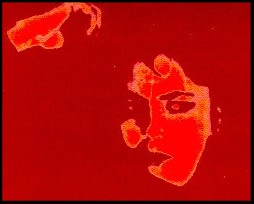
The following is excerpted from a live interview with Mr. Kelemen broadcast on WKCR-FM March 4th, 1996. His first feature, FATE, received its American premiere at Anthology Film Archives in New York.
Ryan Deussing: What were you aiming for when you wrote FATE?
Fred Kelemen: I wanted to show that a human being is not pure, that people are not units. To create impure pictures relates more to the truth about human beings.
RD: You shot on video and used a rough transfer to film. I've seen you quoted as describing this choice of form as a political one--what do you mean by that?
FK: Well, I have a problem with the term political because I'm not a politician, I'm just somebody who makes films. But I think it can be very interesting to move away from the idea of pureness and technical perfection. Pureness is a myth, and the ideology of pureness has created much pain in the world. I think there are no pure feelings and no pure people and no pure races.
RD: Are you reacting to the kind of filmmaking that has become normal in Germany and America?
FK: Yeah. Normally when I watch films I feel a lot of coldness; by destroying "pure" images I wanted to create something warm. You can feel the material--by using film and video I think I created something that is neither one nor the other. It's like an alchemical process; you bring two things together and something totally new comes out of it.
RD: You use a lot of very long shots in the film--were you trying to create a sense of tension by accentuating these very long sequences?
FK: Well, that was actually another reason I used a video camera, to be able to get long, uncut shots. The longest shot in the film is fifteen minutes long, which is impossible to shoot on normal 16mm rolls. A film is cut and edited so that things make sense, and I wanted to keep away from that, to present the images as an emotional message and not just as information. The long shots and camera movement create a sense of emotion, as well as putting you in a position to observe. You have to find your way through the film. Essentially there are two films: the one on the screen and the one you have to create in your head and in your heart. When the emotion is real, the film that has been provoked in your mind can last much longer than the actual one and you can carry it with you.
RD: Funny you should use the word "provoke"--you were just explaining to me before the program that Film Forum thought the film too provocative to pick up, probably because of the scene where a female character is shown urinating. Were you trying to go as far as you could, to show as much as possible?
FK: Well, that scene is not meant to be provocative--it's a reaction that has everything to do with the story and to human behavior. People find it provocative because they are used to films that coat reality with sugar--but life just isn't like that. I just wanted to be very sincere with my story and the situations I developed, I had to be honest with myself and follow every situation in a consequent way to the end--not to stop and to censure myself by saying "no I can't show that." It's very dangerous to show reality as some sort of fairy tale.
RD: Watching the film I didn't know where the two main figures came from or where exactly they were--I just understood that they didn't belong, that they were alien. Were you thinking about Germany or about politics when you developed this scenario?
FK: I think everyone should find a way to live that is not cynical, especially people who make something for an audience. You have to be very aware of what you're doing, and I try not to make films that are "against" what is happening around me. I try to show everything, but not out of cynicism--that's important to me and to why I made this film. And sure they're aliens, but in a sense we are all aliens--we find ourselves in a world we don't understand. We are alienated from ourselves, as well, because we fight the world and we fight each other and we fight our own desires. We all want love, we just don't understand how to get it.
RD: So the film is not about Germany?
FK: Fore sure it's about Germany, but it's also a parable. It deals with very basic human elements that are true everywhere in the world. These problems exist everywhere people exist.
Email: ThingReviews
To post a response fill out the following form and click the "Submit" button. Or go back...
Scroll down to read messages.
ed --
Responds:
poor
